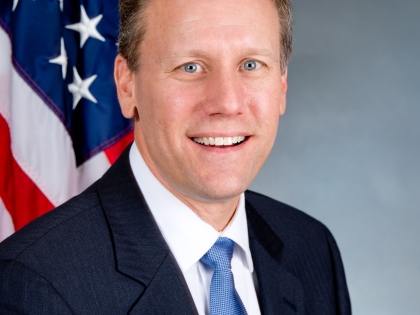
Historic Senate Rules Reform, Sponsored by Senator Valesky, Passes Senate
David J. Valesky
July 16, 2009
ALBANY, N.Y.--The State Senate adopted historic and sweeping rules reform, sponsored by State Senator David J. Valesky (D-Oneida), which will transform Senate operations, decentralize long-held leader control, and give each member of the house, regardless of party, fair opportunity to influence the legislative process.
"The reform package enacted in the Senate today is another giant step forward. This is a new day for the Senate, for all 62 Senators, and for the 19.5 million New Yorkers we represent," Senator Valesky, Vice President Pro-Tempore of the Senate, said.
"I have been a strong advocate for these broad changes for years, and am gratified to see real, definitive results."
Specific changes include term limits on leadership, equal staffing allocation for all senators and increased public access to information.
Groundwork for the overall reforms, which Senator Valesky has championed since being elected to the Senate in 2004, was laid by the work of the bi-partisan Temporary Committee on Rules and Administration Reform, co-chaired by the Senator. The Temporary Committee issued a report that outlined many of the adopted reforms in a report released April 21.
Several of the rules changes were also contained in the Bipartisan Operating Agreement that Senator Valesky and several of his colleagues proposed during the Senate stalemate.
"These reforms represent a paradigm shift in the Senate—a new way of thinking and of doing business. Changes of this magnitude require bi-partisan agreement and cooperation, and I am encouraged that this process will set a new tone," Senator Valesky said.
A summary of the rules changes is as follows:
PROCEDURAL REFORMS TO EMPOWER INDIVIDUAL SENATORS
• Officers and Leaders of the Senate will be term limited to 8 years.
• Members will have greater ability to bring bills to a vote through the Motion for Chamber Consideration. Any sponsor of a bill on third reading can, with the vote of a majority of the members elected, have the bill placed on an active list for a vote by the full Senate.
• The Motion to Discharge is eliminated and replaced by a Petition for Chamber Consideration to empower members to get bills out of committee and onto an active list for a vote by the full Senate. This will pull a bill from committee to the active list upon the acceptance of a petition signed by 3/5 of the members elected (38).
• Non-sponsor amendments would require that the amendment be accepted by the sponsor, in which case it is immediately adopted on the floor; or if not accepted, would require a vote of a majority of the members elected; any bill amended would retain its place on the Calendar until it has properly aged, the sponsor would be able to move to remove his or her name from the bill if he or she chose.
• To increase public notice, the Active List will be published by 8 p.m. the prior evening or 2 hours after session ends the prior day (whichever is later).
• Extends the committee process until the 2nd Friday in June. After that date, all referrals would be to the Rules Committee.
STRENGTHENING THE COMMITTEE PROCESS
• Committee Chairs will be term limited to 8 years.
• Committee membership will be proportional to each Conference’s representation in the Senate as a whole.
• Committee chairs and ranking members will be able to hire their own committee staff, independent of leadership.
• A new committee discharge process will enable a bill sponsor to request through the Journal Clerk that a bill be considered. The committee chair would be required to place the bill on an agenda within 45 days for a vote.
• These changes will give greater power and authority to individual committee chairs and members so they can consider, judge and act on legislation independent of leadership.
• The Temporary Committee on Rules and Reform is continued and will report back by December 1, 2009 regarding substantive reforms to the number and composition of the committees. The committee will develop plans to reduce the number of committees so no member is serving on more than four committees. This will enable the Senate to eliminate proxy voting and ensure members can devote an adequate amount of time to serving on each committee.
• Committees will have guidelines to encourage public hearings on bills and invite speakers to committee meetings to discuss pending legislation.
• To create greater public notice, committee agendas will be released by the Thursday prior to the scheduled meeting by 3 p.m. The Chair could add or remove up to 4 bills with the ranker’s consent up to 24 hours prior. All members would receive notice of the additions or deletions.
• Committee reports will be required annually regarding the committee’s legislative and oversight activities.
GREATER OPENNESS AND TRANSPARENCY
• The Senate will proactively disclose information such as: records of committees, agendas, votes, minutes, reports, attendance, fiscal notes, and votes on the floor, session transcripts, calendars, and expenditure reports by making this information available on its website.
• Committee Meetings and hearings will be recorded and webcast.
• Chamber proceedings will be archived and accessible through the website.
• There will be a joint resolution with the Assembly to create a Legislative Cable channel which will broadcast session and joint hearings.
DISTRIBUTION OF RESOURCES
• For the first time, the administration and operations of the Senate shall be conducted in a fair and nonpartisan manner, including access to services necessary to all members and their offices, without regard to the member’s conference.
• A more equitable distribution of Senate resources will provide individual Senators with greater ability to effectively serve and represent their constituents.
• All 62 Senators will have equal access to Senate services such as mail and printing and a formula will provide satellite offices for Senators with larger geographic districts so they can better represent their districts.
• Discretionary amounts for legislative initiatives and other community grants will be more equitable going forward.
###
Share this Article or Press Release
Newsroom
Go to NewsroomSenator Valesky to Hold Free Senior Fair on October 11 in Madison County
September 21, 2017
Sen. Valesky to Host Community Resources Fair at Boys and Girls Club
September 15, 2017
Donald R. Waful
May 15, 2017
